Corporate Social Responsibility: A Comprehensive Analysis of Arguments
VerifiedAdded on 2020/03/23
|6
|1797
|51
Essay
AI Summary
This essay delves into the ongoing debate surrounding Corporate Social Responsibility (CSR), examining the arguments both for and against its implementation. It explores various definitions of CSR, highlighting its role in integrating social and ethical frameworks within business activities for societal welfare and sustainability. The essay discusses the benefits of CSR, such as innovation and increased profitability, using examples like Unilever and Samsung. It also addresses the criticisms of CSR, including the potential deviation from profit-making objectives and the challenges of balancing shareholder interests with social responsibilities. The essay concludes by acknowledging the continuous debate and the need for businesses to balance their responsibilities towards both society and shareholders. References to relevant academic sources are included to support the arguments presented.
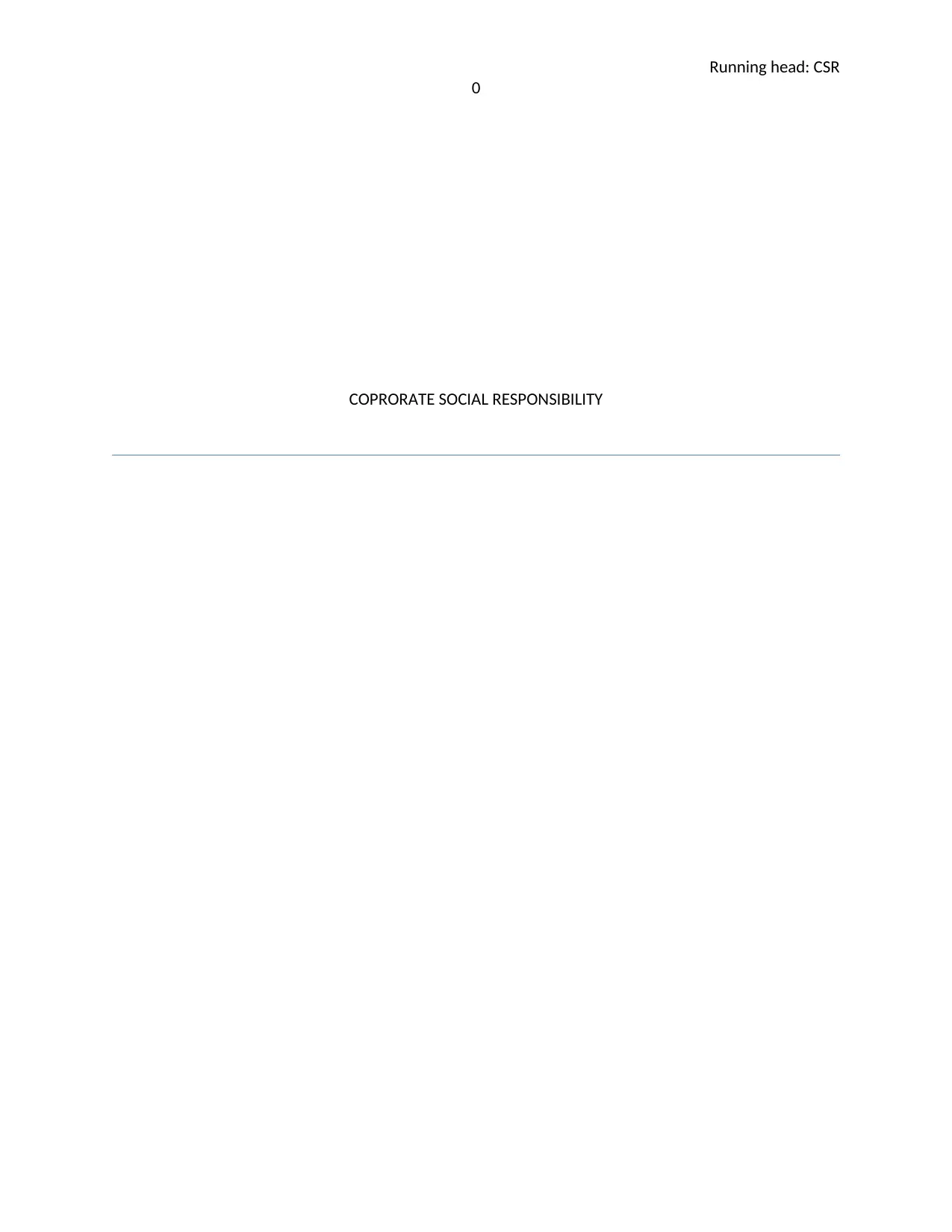
Running head: CSR
0
COPRORATE SOCIAL RESPONSIBILITY
0
COPRORATE SOCIAL RESPONSIBILITY
Paraphrase This Document
Need a fresh take? Get an instant paraphrase of this document with our AI Paraphraser

CSR
1
Table of Contents
CORPORATE SOCIAL RESPONSIBILITY: FOR AND AGAINST..........................................................................1
References:..................................................................................................................................................3
1
Table of Contents
CORPORATE SOCIAL RESPONSIBILITY: FOR AND AGAINST..........................................................................1
References:..................................................................................................................................................3
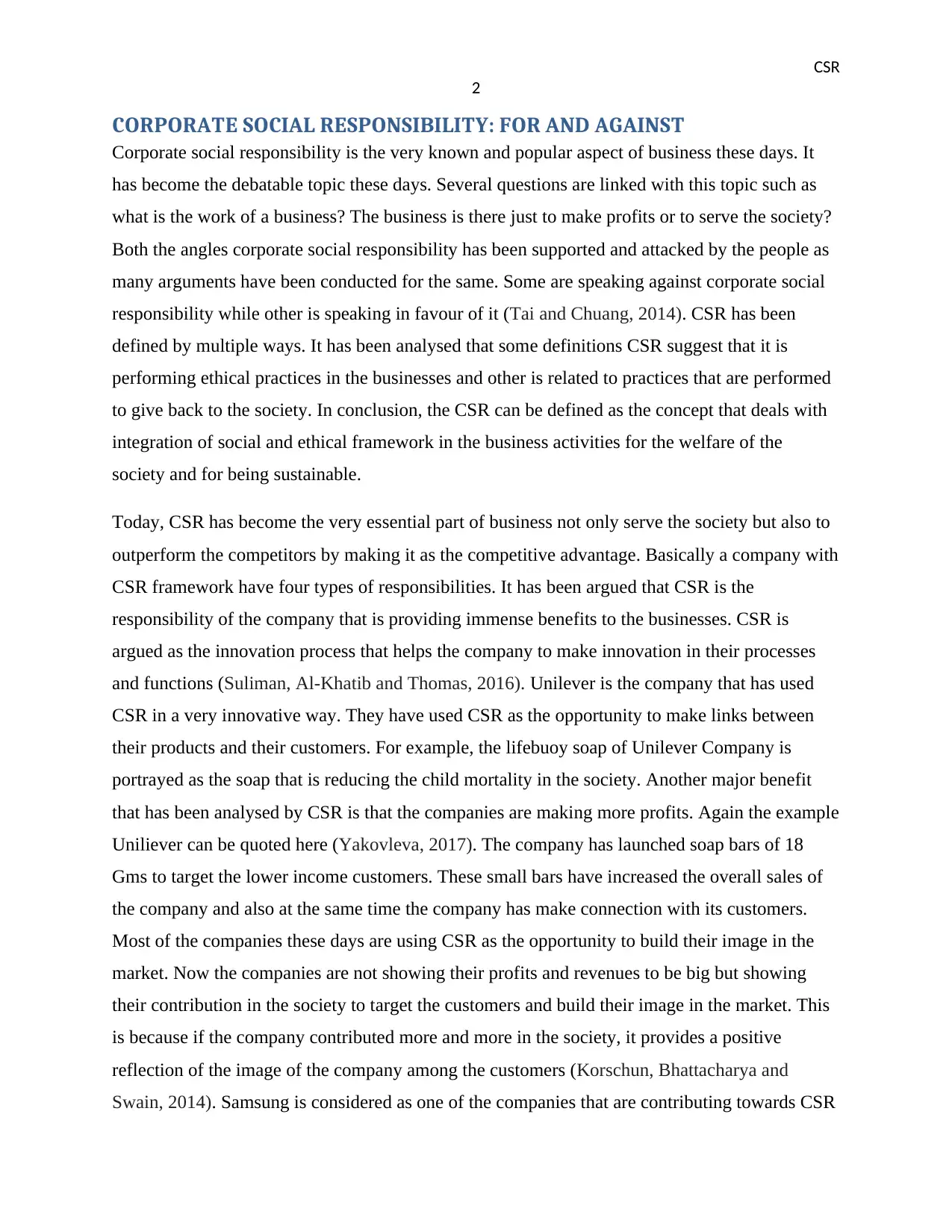
CSR
2
CORPORATE SOCIAL RESPONSIBILITY: FOR AND AGAINST
Corporate social responsibility is the very known and popular aspect of business these days. It
has become the debatable topic these days. Several questions are linked with this topic such as
what is the work of a business? The business is there just to make profits or to serve the society?
Both the angles corporate social responsibility has been supported and attacked by the people as
many arguments have been conducted for the same. Some are speaking against corporate social
responsibility while other is speaking in favour of it (Tai and Chuang, 2014). CSR has been
defined by multiple ways. It has been analysed that some definitions CSR suggest that it is
performing ethical practices in the businesses and other is related to practices that are performed
to give back to the society. In conclusion, the CSR can be defined as the concept that deals with
integration of social and ethical framework in the business activities for the welfare of the
society and for being sustainable.
Today, CSR has become the very essential part of business not only serve the society but also to
outperform the competitors by making it as the competitive advantage. Basically a company with
CSR framework have four types of responsibilities. It has been argued that CSR is the
responsibility of the company that is providing immense benefits to the businesses. CSR is
argued as the innovation process that helps the company to make innovation in their processes
and functions (Suliman, Al-Khatib and Thomas, 2016). Unilever is the company that has used
CSR in a very innovative way. They have used CSR as the opportunity to make links between
their products and their customers. For example, the lifebuoy soap of Unilever Company is
portrayed as the soap that is reducing the child mortality in the society. Another major benefit
that has been analysed by CSR is that the companies are making more profits. Again the example
Uniliever can be quoted here (Yakovleva, 2017). The company has launched soap bars of 18
Gms to target the lower income customers. These small bars have increased the overall sales of
the company and also at the same time the company has make connection with its customers.
Most of the companies these days are using CSR as the opportunity to build their image in the
market. Now the companies are not showing their profits and revenues to be big but showing
their contribution in the society to target the customers and build their image in the market. This
is because if the company contributed more and more in the society, it provides a positive
reflection of the image of the company among the customers (Korschun, Bhattacharya and
Swain, 2014). Samsung is considered as one of the companies that are contributing towards CSR
2
CORPORATE SOCIAL RESPONSIBILITY: FOR AND AGAINST
Corporate social responsibility is the very known and popular aspect of business these days. It
has become the debatable topic these days. Several questions are linked with this topic such as
what is the work of a business? The business is there just to make profits or to serve the society?
Both the angles corporate social responsibility has been supported and attacked by the people as
many arguments have been conducted for the same. Some are speaking against corporate social
responsibility while other is speaking in favour of it (Tai and Chuang, 2014). CSR has been
defined by multiple ways. It has been analysed that some definitions CSR suggest that it is
performing ethical practices in the businesses and other is related to practices that are performed
to give back to the society. In conclusion, the CSR can be defined as the concept that deals with
integration of social and ethical framework in the business activities for the welfare of the
society and for being sustainable.
Today, CSR has become the very essential part of business not only serve the society but also to
outperform the competitors by making it as the competitive advantage. Basically a company with
CSR framework have four types of responsibilities. It has been argued that CSR is the
responsibility of the company that is providing immense benefits to the businesses. CSR is
argued as the innovation process that helps the company to make innovation in their processes
and functions (Suliman, Al-Khatib and Thomas, 2016). Unilever is the company that has used
CSR in a very innovative way. They have used CSR as the opportunity to make links between
their products and their customers. For example, the lifebuoy soap of Unilever Company is
portrayed as the soap that is reducing the child mortality in the society. Another major benefit
that has been analysed by CSR is that the companies are making more profits. Again the example
Uniliever can be quoted here (Yakovleva, 2017). The company has launched soap bars of 18
Gms to target the lower income customers. These small bars have increased the overall sales of
the company and also at the same time the company has make connection with its customers.
Most of the companies these days are using CSR as the opportunity to build their image in the
market. Now the companies are not showing their profits and revenues to be big but showing
their contribution in the society to target the customers and build their image in the market. This
is because if the company contributed more and more in the society, it provides a positive
reflection of the image of the company among the customers (Korschun, Bhattacharya and
Swain, 2014). Samsung is considered as one of the companies that are contributing towards CSR
⊘ This is a preview!⊘
Do you want full access?
Subscribe today to unlock all pages.

Trusted by 1+ million students worldwide
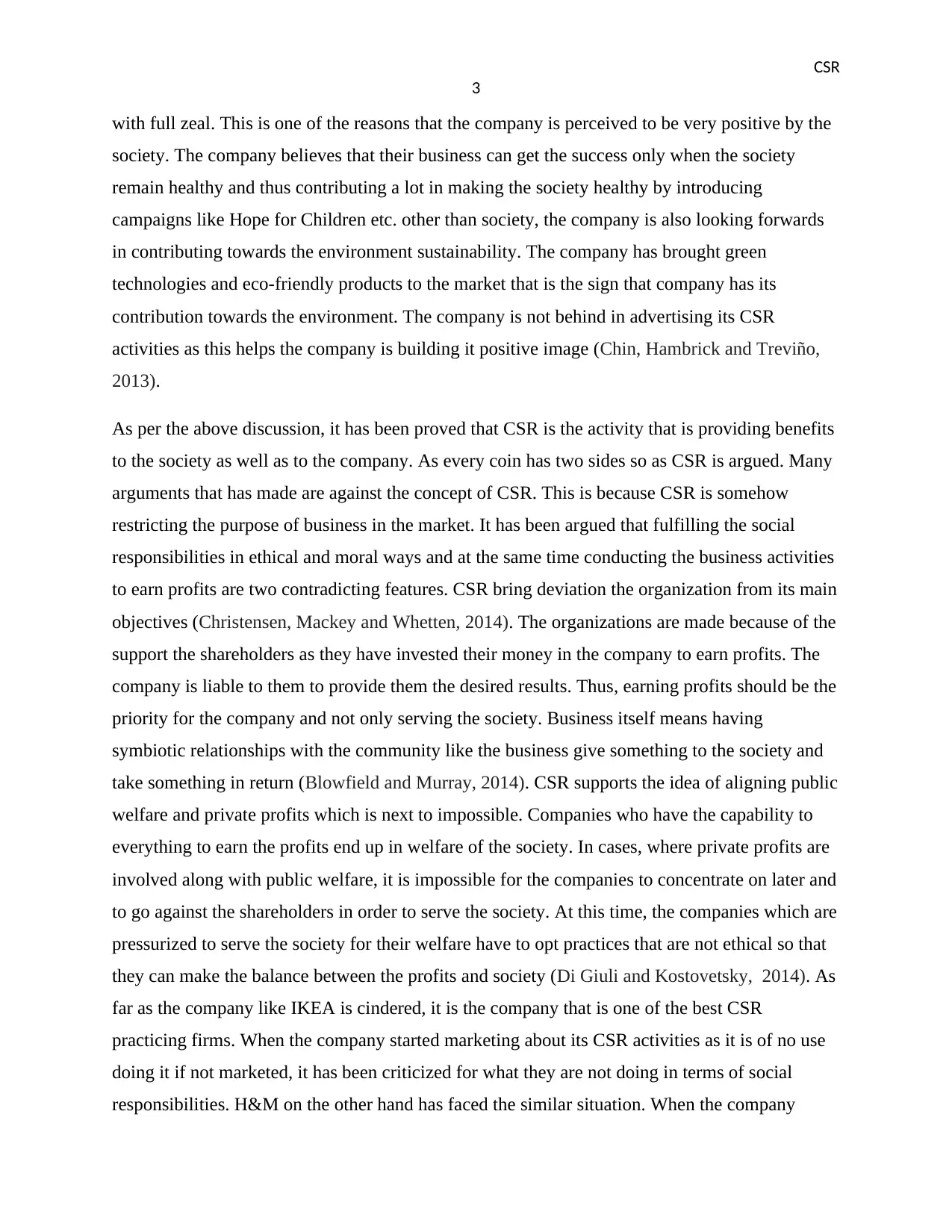
CSR
3
with full zeal. This is one of the reasons that the company is perceived to be very positive by the
society. The company believes that their business can get the success only when the society
remain healthy and thus contributing a lot in making the society healthy by introducing
campaigns like Hope for Children etc. other than society, the company is also looking forwards
in contributing towards the environment sustainability. The company has brought green
technologies and eco-friendly products to the market that is the sign that company has its
contribution towards the environment. The company is not behind in advertising its CSR
activities as this helps the company is building it positive image (Chin, Hambrick and Treviño,
2013).
As per the above discussion, it has been proved that CSR is the activity that is providing benefits
to the society as well as to the company. As every coin has two sides so as CSR is argued. Many
arguments that has made are against the concept of CSR. This is because CSR is somehow
restricting the purpose of business in the market. It has been argued that fulfilling the social
responsibilities in ethical and moral ways and at the same time conducting the business activities
to earn profits are two contradicting features. CSR bring deviation the organization from its main
objectives (Christensen, Mackey and Whetten, 2014). The organizations are made because of the
support the shareholders as they have invested their money in the company to earn profits. The
company is liable to them to provide them the desired results. Thus, earning profits should be the
priority for the company and not only serving the society. Business itself means having
symbiotic relationships with the community like the business give something to the society and
take something in return (Blowfield and Murray, 2014). CSR supports the idea of aligning public
welfare and private profits which is next to impossible. Companies who have the capability to
everything to earn the profits end up in welfare of the society. In cases, where private profits are
involved along with public welfare, it is impossible for the companies to concentrate on later and
to go against the shareholders in order to serve the society. At this time, the companies which are
pressurized to serve the society for their welfare have to opt practices that are not ethical so that
they can make the balance between the profits and society (Di Giuli and Kostovetsky, 2014). As
far as the company like IKEA is cindered, it is the company that is one of the best CSR
practicing firms. When the company started marketing about its CSR activities as it is of no use
doing it if not marketed, it has been criticized for what they are not doing in terms of social
responsibilities. H&M on the other hand has faced the similar situation. When the company
3
with full zeal. This is one of the reasons that the company is perceived to be very positive by the
society. The company believes that their business can get the success only when the society
remain healthy and thus contributing a lot in making the society healthy by introducing
campaigns like Hope for Children etc. other than society, the company is also looking forwards
in contributing towards the environment sustainability. The company has brought green
technologies and eco-friendly products to the market that is the sign that company has its
contribution towards the environment. The company is not behind in advertising its CSR
activities as this helps the company is building it positive image (Chin, Hambrick and Treviño,
2013).
As per the above discussion, it has been proved that CSR is the activity that is providing benefits
to the society as well as to the company. As every coin has two sides so as CSR is argued. Many
arguments that has made are against the concept of CSR. This is because CSR is somehow
restricting the purpose of business in the market. It has been argued that fulfilling the social
responsibilities in ethical and moral ways and at the same time conducting the business activities
to earn profits are two contradicting features. CSR bring deviation the organization from its main
objectives (Christensen, Mackey and Whetten, 2014). The organizations are made because of the
support the shareholders as they have invested their money in the company to earn profits. The
company is liable to them to provide them the desired results. Thus, earning profits should be the
priority for the company and not only serving the society. Business itself means having
symbiotic relationships with the community like the business give something to the society and
take something in return (Blowfield and Murray, 2014). CSR supports the idea of aligning public
welfare and private profits which is next to impossible. Companies who have the capability to
everything to earn the profits end up in welfare of the society. In cases, where private profits are
involved along with public welfare, it is impossible for the companies to concentrate on later and
to go against the shareholders in order to serve the society. At this time, the companies which are
pressurized to serve the society for their welfare have to opt practices that are not ethical so that
they can make the balance between the profits and society (Di Giuli and Kostovetsky, 2014). As
far as the company like IKEA is cindered, it is the company that is one of the best CSR
practicing firms. When the company started marketing about its CSR activities as it is of no use
doing it if not marketed, it has been criticized for what they are not doing in terms of social
responsibilities. H&M on the other hand has faced the similar situation. When the company
Paraphrase This Document
Need a fresh take? Get an instant paraphrase of this document with our AI Paraphraser
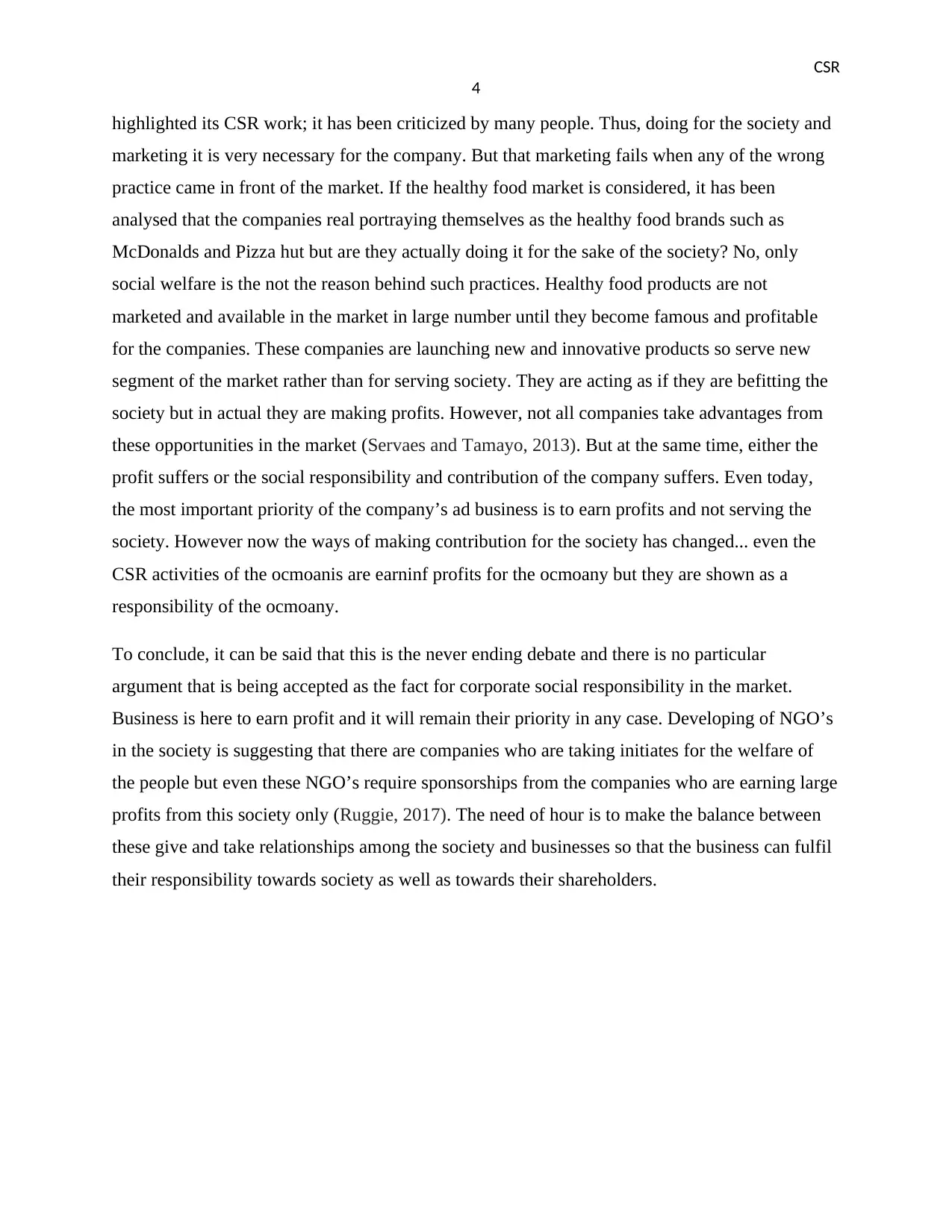
CSR
4
highlighted its CSR work; it has been criticized by many people. Thus, doing for the society and
marketing it is very necessary for the company. But that marketing fails when any of the wrong
practice came in front of the market. If the healthy food market is considered, it has been
analysed that the companies real portraying themselves as the healthy food brands such as
McDonalds and Pizza hut but are they actually doing it for the sake of the society? No, only
social welfare is the not the reason behind such practices. Healthy food products are not
marketed and available in the market in large number until they become famous and profitable
for the companies. These companies are launching new and innovative products so serve new
segment of the market rather than for serving society. They are acting as if they are befitting the
society but in actual they are making profits. However, not all companies take advantages from
these opportunities in the market (Servaes and Tamayo, 2013). But at the same time, either the
profit suffers or the social responsibility and contribution of the company suffers. Even today,
the most important priority of the company’s ad business is to earn profits and not serving the
society. However now the ways of making contribution for the society has changed... even the
CSR activities of the ocmoanis are earninf profits for the ocmoany but they are shown as a
responsibility of the ocmoany.
To conclude, it can be said that this is the never ending debate and there is no particular
argument that is being accepted as the fact for corporate social responsibility in the market.
Business is here to earn profit and it will remain their priority in any case. Developing of NGO’s
in the society is suggesting that there are companies who are taking initiates for the welfare of
the people but even these NGO’s require sponsorships from the companies who are earning large
profits from this society only (Ruggie, 2017). The need of hour is to make the balance between
these give and take relationships among the society and businesses so that the business can fulfil
their responsibility towards society as well as towards their shareholders.
4
highlighted its CSR work; it has been criticized by many people. Thus, doing for the society and
marketing it is very necessary for the company. But that marketing fails when any of the wrong
practice came in front of the market. If the healthy food market is considered, it has been
analysed that the companies real portraying themselves as the healthy food brands such as
McDonalds and Pizza hut but are they actually doing it for the sake of the society? No, only
social welfare is the not the reason behind such practices. Healthy food products are not
marketed and available in the market in large number until they become famous and profitable
for the companies. These companies are launching new and innovative products so serve new
segment of the market rather than for serving society. They are acting as if they are befitting the
society but in actual they are making profits. However, not all companies take advantages from
these opportunities in the market (Servaes and Tamayo, 2013). But at the same time, either the
profit suffers or the social responsibility and contribution of the company suffers. Even today,
the most important priority of the company’s ad business is to earn profits and not serving the
society. However now the ways of making contribution for the society has changed... even the
CSR activities of the ocmoanis are earninf profits for the ocmoany but they are shown as a
responsibility of the ocmoany.
To conclude, it can be said that this is the never ending debate and there is no particular
argument that is being accepted as the fact for corporate social responsibility in the market.
Business is here to earn profit and it will remain their priority in any case. Developing of NGO’s
in the society is suggesting that there are companies who are taking initiates for the welfare of
the people but even these NGO’s require sponsorships from the companies who are earning large
profits from this society only (Ruggie, 2017). The need of hour is to make the balance between
these give and take relationships among the society and businesses so that the business can fulfil
their responsibility towards society as well as towards their shareholders.
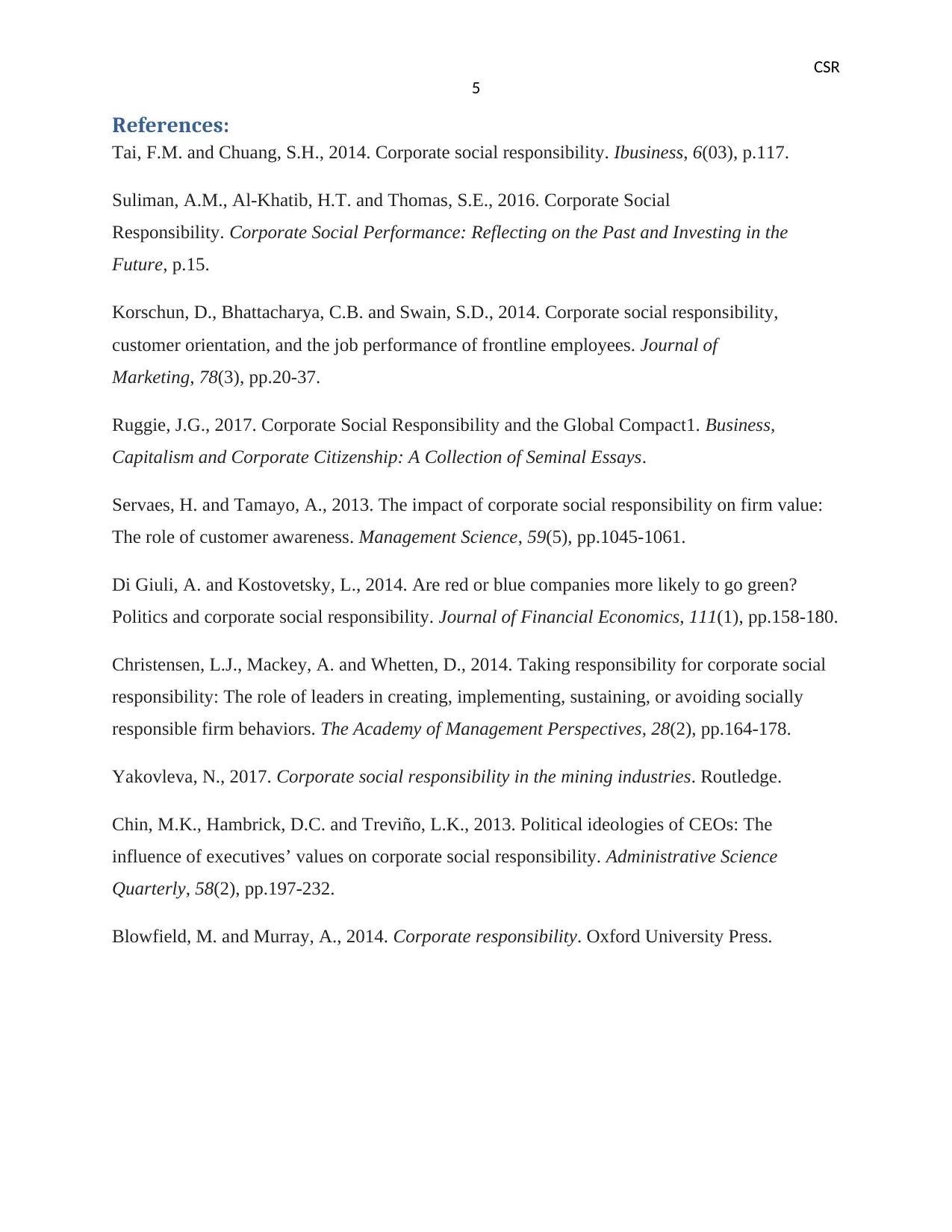
CSR
5
References:
Tai, F.M. and Chuang, S.H., 2014. Corporate social responsibility. Ibusiness, 6(03), p.117.
Suliman, A.M., Al-Khatib, H.T. and Thomas, S.E., 2016. Corporate Social
Responsibility. Corporate Social Performance: Reflecting on the Past and Investing in the
Future, p.15.
Korschun, D., Bhattacharya, C.B. and Swain, S.D., 2014. Corporate social responsibility,
customer orientation, and the job performance of frontline employees. Journal of
Marketing, 78(3), pp.20-37.
Ruggie, J.G., 2017. Corporate Social Responsibility and the Global Compact1. Business,
Capitalism and Corporate Citizenship: A Collection of Seminal Essays.
Servaes, H. and Tamayo, A., 2013. The impact of corporate social responsibility on firm value:
The role of customer awareness. Management Science, 59(5), pp.1045-1061.
Di Giuli, A. and Kostovetsky, L., 2014. Are red or blue companies more likely to go green?
Politics and corporate social responsibility. Journal of Financial Economics, 111(1), pp.158-180.
Christensen, L.J., Mackey, A. and Whetten, D., 2014. Taking responsibility for corporate social
responsibility: The role of leaders in creating, implementing, sustaining, or avoiding socially
responsible firm behaviors. The Academy of Management Perspectives, 28(2), pp.164-178.
Yakovleva, N., 2017. Corporate social responsibility in the mining industries. Routledge.
Chin, M.K., Hambrick, D.C. and Treviño, L.K., 2013. Political ideologies of CEOs: The
influence of executives’ values on corporate social responsibility. Administrative Science
Quarterly, 58(2), pp.197-232.
Blowfield, M. and Murray, A., 2014. Corporate responsibility. Oxford University Press.
5
References:
Tai, F.M. and Chuang, S.H., 2014. Corporate social responsibility. Ibusiness, 6(03), p.117.
Suliman, A.M., Al-Khatib, H.T. and Thomas, S.E., 2016. Corporate Social
Responsibility. Corporate Social Performance: Reflecting on the Past and Investing in the
Future, p.15.
Korschun, D., Bhattacharya, C.B. and Swain, S.D., 2014. Corporate social responsibility,
customer orientation, and the job performance of frontline employees. Journal of
Marketing, 78(3), pp.20-37.
Ruggie, J.G., 2017. Corporate Social Responsibility and the Global Compact1. Business,
Capitalism and Corporate Citizenship: A Collection of Seminal Essays.
Servaes, H. and Tamayo, A., 2013. The impact of corporate social responsibility on firm value:
The role of customer awareness. Management Science, 59(5), pp.1045-1061.
Di Giuli, A. and Kostovetsky, L., 2014. Are red or blue companies more likely to go green?
Politics and corporate social responsibility. Journal of Financial Economics, 111(1), pp.158-180.
Christensen, L.J., Mackey, A. and Whetten, D., 2014. Taking responsibility for corporate social
responsibility: The role of leaders in creating, implementing, sustaining, or avoiding socially
responsible firm behaviors. The Academy of Management Perspectives, 28(2), pp.164-178.
Yakovleva, N., 2017. Corporate social responsibility in the mining industries. Routledge.
Chin, M.K., Hambrick, D.C. and Treviño, L.K., 2013. Political ideologies of CEOs: The
influence of executives’ values on corporate social responsibility. Administrative Science
Quarterly, 58(2), pp.197-232.
Blowfield, M. and Murray, A., 2014. Corporate responsibility. Oxford University Press.
⊘ This is a preview!⊘
Do you want full access?
Subscribe today to unlock all pages.

Trusted by 1+ million students worldwide
1 out of 6
Related Documents
Your All-in-One AI-Powered Toolkit for Academic Success.
+13062052269
info@desklib.com
Available 24*7 on WhatsApp / Email
![[object Object]](/_next/static/media/star-bottom.7253800d.svg)
Unlock your academic potential
Copyright © 2020–2026 A2Z Services. All Rights Reserved. Developed and managed by ZUCOL.





